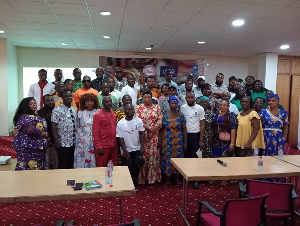The National Insurance Commission (NIC) has instructed insurance companies to create customized insurance products aimed at enhancing access specifically tailored for the informal sector in Ghana.
Acting Commissioner of Insurance, Mr. Michael K. Andoh, issued this directive during the climax of a six-week-long Inclusive Insurance Awareness Clinic Programme in Accra, an event focused on empowering informal workers on risk identification and resilience through inclusive insurance.
The clinics, supported by the United Nations Development Programme (UNDP) under the Insurance and Risk Finance Facility (IRFF), gathered leaders from various informal sector associations, including commercial drivers, market women, artisans, and small business owners.
Andoh emphasized that the NIC has been working closely with insurers to design innovative insurance products that meet the unique needs of the informal workforce, which represents a significant portion of the national labour force yet often lacks access to insurance in times of disaster.
“People in the informal sector frequently face unforeseen disasters, yet traditional insurance services have not adequately addressed their needs.
Inclusive insurance provides income protection, ensuring individuals can recover swiftly from losses,” Mr. Andoh said.
He highlighted that these new insurance solutions could provide relief, offering alternatives to support from government bodies such as the National Disaster Management Organization (NADMO).
The training sessions also equipped the association leaders with the knowledge needed to advise their members on how to interact with insurers and understand the terms and conditions of insurance products.
“Our goal is for leaders to understand the details of inclusive insurance so they can confidently ask questions when sales agents approach them,” Mr. Andoh added.
Mr. Kyeame Ghansah, NIC’s Head of Research and lead facilitator, addressed the specific insurance needs identified through the various outreach in especially rural Accra.
He underscored that these efforts aim to bridge gaps between insurers and the informal sector.
UNDP’s Insurance and Risk Finance Facility Coordinator, Dr. Amina Sammo, explained the importance of inclusive business insurance as distinct from life, health, or property insurance.
“Business insurance protects goods and assets against unforeseen events, allowing traders to avoid substantial financial losses in times of crisis,” she noted.
With business insurance, she added, individuals are less likely to depend on government support following events such as fires or floods, as they can activate their insurance claims to mitigate losses.
The awareness campaign aims to prepare informal sector leaders to disseminate information on initiating claims and the benefits of business insurance, particularly for market women and artisans.
According to Madam Sammo, the programme’s goal is to ensure that informal businesses have access to reliable insurance solutions within the next one to five years, fostering resilience and financial security across Ghana’s informal sector.



